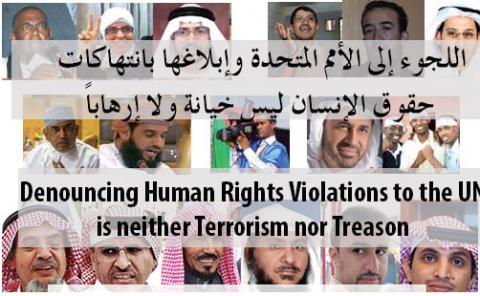
Arab States Continue to Crackdown on Human Rights Activists, Alkarama Tells UN Secretary General
Human rights defenders in Algeria, Egypt, Iraq, Morocco, the United Arab Emirates and Saudi Arabia continue to be targeted because of their cooperation with the United Nations (UN), Alkarama said in a report to the United Nations Secretary General (UNSG) António Guterres. Since 2010, the UNSG reports annually on reprisals committed by UN Member States against individuals who inform the UN about human rights violations in their countries. Notably accused of “terrorism” or “spreading false information”, rights activists continue to be systematically attacked by Arab governments.
When activism becomes “terrorism”…
Abducted, secretly detained for 20 days, electrocuted and raped by State security officers in order to force him to confess his membership to a “banned group”, 56-year-old Ahmed Amasha was charged under the Anti-terrorism Law for having communicated cases of enforced disappearances and arbitrary detention to the UN. The treatment received by Amasha illustrates the severity of the crackdown on human rights defenders in the country. Egypt is however not the only one to use the pretext of counterterrorism to prosecute individuals who denounce human rights violations to the UN. In Algeria, Rafik Belamrania was arrested in February 2017 and interrogated over a complaint he submitted to the Human Rights Committee on the case of his father who was abducted and executed by the army in 1995. As a result, he was charged with “incitement to terrorism”, which under Algerian law includes any attack to “the symbols of the Nation and the Republic”. His trial is ongoing to this day.
… or a threat to security or reputation of the State
In Saudi Arabia and the United Arab Emirates, human rights defenders continue to be prosecuted for “threatening the security of the State” or “tarnishing its reputation”. Such a practice is exemplified by the case of prominent Saudi activist Essa Al Hamid who was sentenced in December 2016 to 11 years in prison for “communicating with international organisations in order to harm the image of the State” as a result of his activism within the Saudi Civil and Political Rights Association. Similarly, in the UAE, human rights defender and blogger Osama Al Najjar was victim of the State’s systematic crackdown on peaceful dissent. In March 2017, as his three-year prison sentence for “instigating hatred against the State via Twitter” and “designing and running a website harmful to UAE institutions” expired, the authorities refused to free him and ordered his transfer to a counselling centre, because he was deemed “a threat to society”. He remains in detention and does not know when – or if – he will be released.
Vicious threats against activists
States have also resorted to threats against peaceful activists to prevent them from denouncing human rights violations. In Iraq, human rights activist Salam Al Hashimi was threatened by the security services and forced to flee his country because of his work documenting cases to the UN Committee on Enforced Disappearances. Since his escape, security forces and militiamen have repeatedly threatened people close to him in order to locate him and in February 2017, abducted one of his young employees.
“What is shocking is that States respond to peaceful activism by committing the very same human rights violations that were denounced in the first place by activists,” says Inès Osman, Legal Coordinator at Alkarama. “The fact that shedding light on human rights violations is seen as a threat to State security shows how ‘insecure’ these regimes are, but also how their stability depends on their ability to shut down critical voices.”
For more information or an interview, please contact media@alkarama.org (Tel: +41 22 734 1008)
